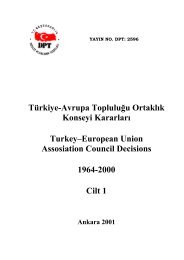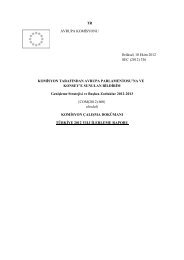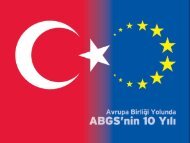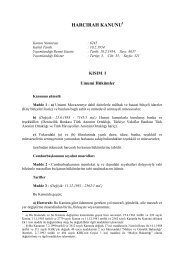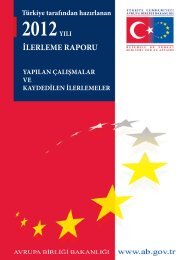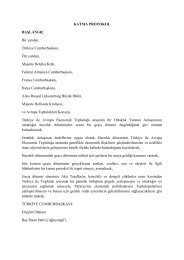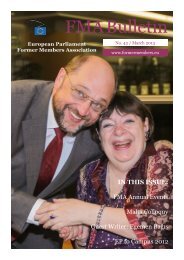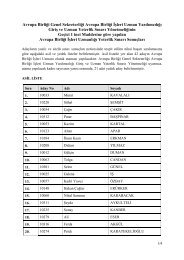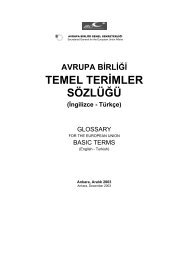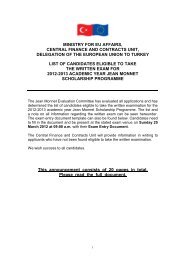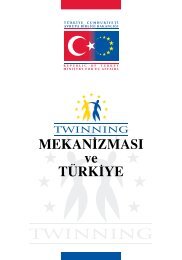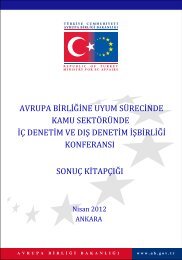2010 ilerleme raporu - Avrupa BirliÄi BakanlıÄı
2010 ilerleme raporu - Avrupa BirliÄi BakanlıÄı
2010 ilerleme raporu - Avrupa BirliÄi BakanlıÄı
You also want an ePaper? Increase the reach of your titles
YUMPU automatically turns print PDFs into web optimized ePapers that Google loves.
esistance to security officers for their participation in meetings or demonstrations, will no<br />
longer be sentenced also for membership of a terrorist organisation. In general, the law<br />
provides for the non-application on juveniles of a number of aggravating circumstances<br />
included in the Anti-Terror Law. This is expected to reduce in practice significantly the prison<br />
sentences imposed on children participating in meetings or demonstrations. Finally, the law<br />
foresees that juvenile courts can decide to postpone the announcement of a judgement, to<br />
convert a prison sentence to alternative sanctions, or to suspend the sentence for terror-related<br />
crimes.<br />
As regards minority rights and cultural rights, Turkey has made progress on cultural rights,<br />
especially by further relaxing use of the Kurdish language in private TV and radio broadcasts<br />
and in prisons. The 24-hour Arabic-language TV broadcasts started in <strong>2010</strong> in addition to the<br />
Kurdish-language TV channel which started the previous year. However, restrictions remain,<br />
particularly on use of languages other than Turkish in political life, education and contacts<br />
with public services. The legislation on use of languages other than Turkish is open to<br />
restrictive interpretations and implementation is inconsistent. There has been some progress in<br />
the situation of the Roma, as their issues have become more publicly debated, and<br />
implementation is underway. However, Roma still frequently face discriminatory treatment.<br />
Turkey's approach on minorities remains restrictive. Full respect for and protection of<br />
language, culture and fundamental rights, in accordance with European standards, have yet to<br />
be fully achieved. Turkey needs to make further efforts to enhance tolerance or promote<br />
inclusiveness vis-à-vis minorities.<br />
Overall, there has been progress in the area of the judiciary. The adoption of the constitutional<br />
amendments on the structure of the High Council of Judges and Prosecutors along with the<br />
limitation of the competence of military courts is a positive step. Attention needs to be paid on<br />
the establishment of an effective dialogue with all stakeholders and the civil society at large,<br />
and on the implementation of these reforms in line with European standards. With respect to<br />
anti-corruption, progress was made as regards the development of a comprehensive anticorruption<br />
strategy and an action plan as well as a body to oversee and monitor their<br />
implementation. However, effective implementation of the Strategy is necessary to mitigate<br />
corruption which remains prevalent in many areas. Turkey needs to develop a track record of<br />
investigation, indictments and convictions. With regard to fundamental rights, progress has<br />
been made. Constitutional amendments bring important changes in the area of data protection,<br />
trade union rights, women and children's rights. However, further significant efforts are<br />
needed in most areas, in particular freedom of expression and freedom of religion. Turkey's<br />
approach to minority rights remains restrictive.<br />
4.24. Chapter 24: Justice, freedom and security<br />
Some progress has been made with regard to migration. An amendment to Article 79 of the<br />
Turkish Penal Code on smuggling of migrants increasing the sentences for those involved in<br />
migrant smuggling, was adopted in July <strong>2010</strong>. In March <strong>2010</strong>, a circular was issued by the<br />
Ministry of the Interior on combating irregular migration. According to the circular, an<br />
irregular migrant for whom the legal procedures have been completed will be placed in a<br />
removal centre or alternative premises previously indicated by the governorate. The circular<br />
also lays down the ‘principles concerning the physical conditions in removal centres and the<br />
practices adopted in these centres’, stating that removal centres need to be regularly inspected<br />
by the governor, district governor and the Turkish National Police (TNP); allegations of<br />
human rights violations in removal centres need to be investigated; irregular migrants need to<br />
EN 80 EN




